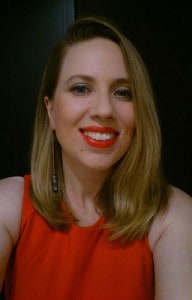
After a huge weekend at the Australian Natcon, I’ve had some time to recover from what was an epic four days. It was great to catch up with some old friends and meet some new ones. After being in the fan scene for a couple of years now, I’m feeling much more at home at conventions. The Guests of Honour, Ben Aaronovich, Jill Pantozzi, Keri Arthur and Maria Lewis, were all incredibly entertaining. I don’t think I’ve laughed this much at a convention, especially at the fan fund auction where you could even bid on a piece of string.
I attended my first Aurealis and Ditmar awards during the con. It’s not often I get the chance to dress up (spending most of the week in flat shoes running around film shoots) so I take any excuse to get out a fancy outfit and bring out my signature red lippy. The big winners from the Aurealis awards were Deb Kalin for Cherry Crow Children, and Trent Jamieson for Day Boy. I was really pleased to see Kathleen Jennings win three Ditmar awards, apart from being a super-talented artist, she’s a fabulous person too! She reminded us all of the importance of nominating people, so if you know someone who is an excellent artist, reviewer or writer in the community, make sure you tell people about them.
What I loved about Contact2016:
-
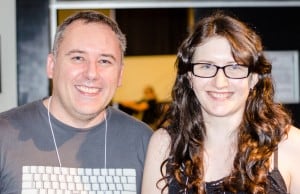
Two of my lovely Melbourne writer friends, Aidan Doyle and Michelle Goldsmith Hearing Keri Arthur talk about her publishing journey. Her Guest of Honour speech was a pragmatic and honest talk about her road to being a New York Times bestseller. It was really encouraging – it took her 10 years and many rejections to get her first books published.
- Chatting with people about books I love (and they love too), especially reviewer and editor Elizabeth Fitzgerald from Earl Grey Editing, Rivqa Rafael, and Helen Stubbs about Kushiel’s Dart.
- Getting a chance to history nerd-out, especially listening to Ben Aaronovich talk about the bizarre history of London. I probably bored a few people telling them about my recent research into the city and the wacky things that happened on the river.
- The fact everyone seemed to have a chaise lounge/fainting couch in their hotel room. In case of swooning.
For those of you who couldn’t make it, I’ve written up a few notes on things I really got out of it. Most of the panels I attended and took notes in were regarding professional sales and publishing, as I’m writing a new book and looking ahead to getting it published.
Red Herrings Panel
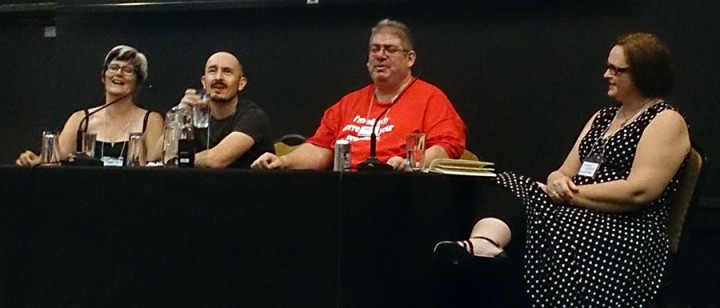
The panel on Red Herrings had some good advice about writing crime. The panel was divided on plotting and pantsing, but Aaronovich pointed out that either way you need to know how the crime was committed. Avoiding coincidence was highly advised, unless it was in the first part of the book to get the character involved in the investigation. As for myself, I’ve recently swapped from pantsing to plotting and it’s been a lot easier to write the book, because I’m not worried about getting lost. Plus you don’t lose the murder weapon…
The panel noted it’s rare for a crime book to have an unsatisfactory ending, but I thought of Blowup, the great film by Antonioni, about a photographer who photographs a dead body which disappears the next day, and which was an influence on my own novella, Double Exposure. The ambiguous ending is a hard thing to pull off, and essentially it needs to be about the character’s story arc versus the crime itself.
Sexy Lamps and the Bechdel Test
I pretty much spent this whole panel agreeing with the panellists. They talked about the tests which are demonstrators of the role of women in culture, especially films, comics and media. They include:
- The Bechdel Test: Where two women talk to each other and not about men.
- The Sexy Lamps Test: Can you replace a female character with a sexy lamp?
- Women in Refrigerators: Where a woman is killed or injured to advance a male character’s story.
- The Furiosa Test: Does it make men angry about feminism?
None of these are definitive tests, but they are certainly good divining rods of how your writing represents women. I think about them in my own work quite a bit, especially when I’m writing crime. How can I represent women differently? How can I undermine these tropes? How do women fulfill their roles in the story?
Selling across the ditch
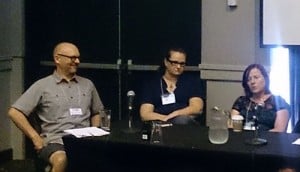
All four panellists had sold books overseas, and it was a very useful panel for aspiring authors. Their advice included:
- Don’t sell world rights.
- ALWAYS read your contract. If you don’t understand it, get it assessed by a professional. Ask questions.
- Demonstrate your value to an agent by having previous sales under your belt.
- Your social media prescence doesn’t mean anything if your writing isn’t good enough.
- Two books were recommended – The First Five Pages and Self-Editing for Authors
Angela Slatter, on looking for an agent said, “It’s very important not to appear insane.” Sean Williams also ran through his “Why, What, How, When, Who” publishing process which I found really helpful:
- Why do you want to be published in this market?
- What are you trying to sell in the market? Novel? Short Stories?
- How do you sell them? Through an agent/direct to publisher/website?
- Where are you trying to sell? Major or small publishers? For lit cred/awards/sales?
- Who are you trying to sell this to?
I’m always encouraged to hang out with other writers, as it spurs me on to keep writing and working hard at what I love. A huge thanks to Aimee Lindorff and the Contact team who put it together. It was a really successful weekend.
I’m still doing my survey about starting an Australian Science Fiction and Fantasy Writers’ Association. If you’re a writer, publisher or artist, I’d love it if you could answer a few short questions here. I’m also involved in the committee for Continuum, Melbourne’s annual science fiction convention. You should all come! Because cons are fun! If you’re planning to come down, drop me a line!
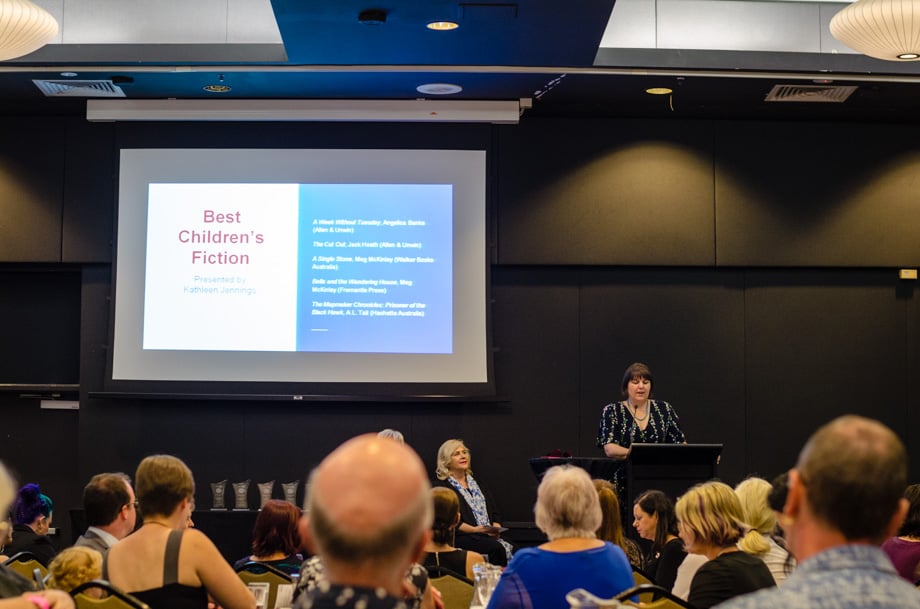
Share your thoughts